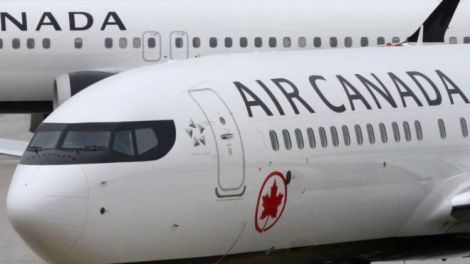Come on, really?
Air Canada fined for not using French language

Air Canada has been ordered to pay a French-speaking couple 21,000 Canadian dollars (£12,900; $15,700) and write them a letter of apology for violating their linguistic rights.
The couple complained that some signs on a domestic flight they took were only in English, while others gave the French version less prominence.
A judge ruled that the airline had breached Canada’s bilingualism laws.
Air Canada reportedly told the court it would work to replace the signs.
Ontario couple Michel and Lynda Thibodeau filed 22 complaints against the airline in 2016.
Among them, they argued that the word “lift” was engraved on the buckles of their seatbelts in English but not in French, while French translations of words such as “exit” were in smaller characters.
They also said the English-language boarding announcement for their Montreal-bound flight was more thorough than the French version.
“Air Canada systematically violates the linguistic rights of Francophones,” the couple argued, according to the written judgment for the case.
In the ruling, the Ottawa court judge agreed that the airline had “not upheld its linguistic obligations”.
Air Canada is subject to the country’s Official Languages Act, which seeks to ensure that English and French are given equal status.
The airline had argued that the couple was interpreting the act too strictly, according to the court documents.
In an interview with Canadian broadcaster CBC, Mr Thibodeau said he was satisfied with the judgement but hoped to see signs on Air Canada flights improve in the future.
“Signage must be of equal quality,” he said. “My expectation is that within a couple of months, we will be able to fly on any Air Canada plane, and finally signage will be in both official languages.”
It is not the first time the couple have accused the airline of violating their linguistic rights. In 2014, the Supreme Court ruled that they could not sue Air Canada over a mistaken drink order on an international flight and would have to settle for an apology, the Toronto Sun reported.
Among them, they argued that the word “lift” was engraved on the buckles of their seatbelts in English but not in French, while French translations of words such as “exit” were in smaller characters.
Really, the word lift wasn’t etched into the belt buckle with the English word?
While English words like ‘Exit’ were in a more prominent font to the French language?
Two years ago
The unofficial greeting in the bilingual Canadian city of Montreal has long been a friendly “Bonjour, Hi!”
But that standard is no more since a motion mandating store clerks to greet customers only in French was passed in Quebec’s provincial legislature.
The move reaffirms French as the primary language in the province, where use of English can be controversial.
The motion - which is not a law - was passed unanimously, but the province’s premier called the debate “ridiculous”.
Introduced by the fiercely Francophile Parti Quebecois, the motion “invites all businesses and workers who enter into contact with local and international clients to welcome them warmly with the word ‘bonjour’”.
“It’s about being original and being ourselves, and being ourselves is a major Francophone city with an Anglophone community,” said PQ house leader Pascal Bérubé.
Rebelling against Quebec’s ‘language police’
“First thing you have to say, I think, is ‘bonjour.’ It’s about respect, it’s easy to understand.”
Premier Philippe Couillard, a Liberal, objected to the original wording of the motion, which called the inclusion of “Hi” in greetings “an irritant”. He accused the PQ of trying to fan the flames of language war and stoke division in the province.
He said the whole debate was “ridiculous”, but agreed to vote in favour of the motion once the word “irritant” was removed.
Many in Quebec see their French identity as being under threat. It is the only Canadian province where French is the sole official language.
However, there are also sizeable Anglophone communities within Quebec, especially in the cosmopolitan hub of Montreal.
The place that banned the term grilled cheese and cocktail
The Office quebecois de la langue francaise (OQLF) oversees the preservation of the French language in the province - sometimes at the expense of commonly used words.
In 2013, an Italian restaurant came under pressure to remove “pasta” from its menu because it is not a French word.
In 2016, a restaurant called La Mama Grilled Cheese in Quebec City received a letter from the language agency chastising them for their Anglicism.
This year, the language watchdog quietly loosened some of its restrictions, allowing words like “grilled cheese”, “cocktail” and “drag queen” back into the lexicon.
So where’s the bilingualism on the French Canadian side (note I didn’t say French, because even the French don’t class French Canadians as French).